How theatre survived a year of closure
How theatre survived a year of closure. Photo: Shakespeare's Globe. Credit: Unsplash
Today marks a year since theatres across the country were forced to close. The past 12 months have been a period of remarkable resilience and innovation for the industry, which has embraced online streaming – and the uncomfortable presence of a camera between stage and audience – in a bid to stay alive against the odds and in the face of unimaginable displacement.
On Monday 16 March 2020, the Society of London Theatre (SOLT) and UK Theatre issued a joint statement ordering theatres to close with immediate effect to help slow the rapid spread of Covid-19. The announcement came at 6.40pm, shortly before curtains were due to rise across London’s West End (and beyond), leaving Theatreland awash with confusion. Would-be theatregoers arrived at venues – some having travelled to London from other parts of the country with pre-booked tickets – only to be told the evening’s performance would not be going ahead.
The warning signs were there. Broadway had shut down entirely four days earlier on Thursday 12 March (and, unlike the West End, has not reopened intermittently between lockdowns). Audience numbers had been dwindling too, with many ticket-holders choosing to cut their losses and stay at home for fear of catching the virus. A handful of venues, including the Arcola theatre in Dalston, had already suspended all public performances.
The grave but necessary decision to close all theatres was monumental and (for want of a less overused term) unprecedented. But few could have predicted that our theatres would remain dark, their doors locked, a year on.
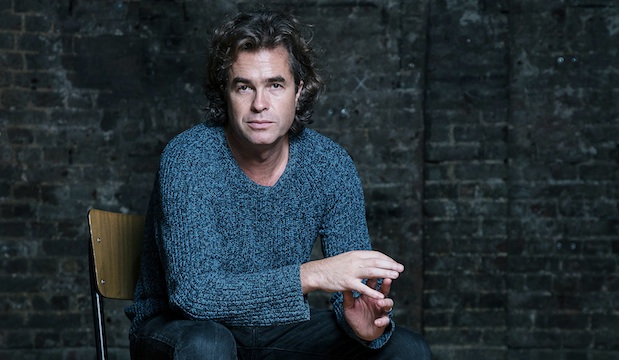
Rupert Goold, artistic director at the Almeida Theatre. Photo: Chris McAndrew
'Back in March last year it was unthinkable that we’d still be in this position now,' says the Almeida Theatre’s artistic director Rupert Goold, who describes his current state of mind as 'tired' and 'grieving', but thankful that children have gone back to school.
A lot has happened to the theatre industry over the last 12 months. While the venues themselves have fallen silent, it’s been a laborious year for many industry professionals, who have been forced to make considerable sacrifices and drastically adapt their ways of working, pushing theatre into its most significant period of innovation in decades.
The initial weeks of lockdown saw frantic theatre-makers rally together, with everyone from graduates through to celebrities taking part in a spate of new online initiatives, performing readings of Shakespeare on Zoom, musical hits for YouTube scratch nights and everything in between. Much of what ran was thanks to the bravery of its cast members, many of whom put aside their own financial concerns to participate in unpaid initiatives out of sheer devotion to the performing arts.
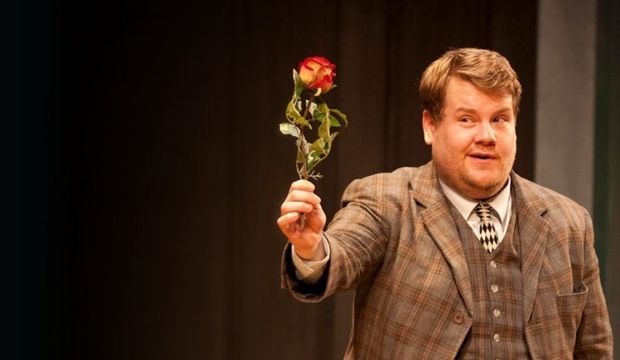
James Corden in One Man, Two Guvnors
It wasn’t long before online theatre hit the mainstream. On Thursday 2 April, the National Theatre streamed its first ‘live’ YouTube performance: 2011’s smash-hit production of Richard Bean’s comedy One Man, Two Guvnors, starring James Corden. It was a national success, with over 209,000 theatre-starved households tuning in at 7pm to watch the show play out in real time.
Sensing the appetite, the National Theatre occupied that same weekly slot to stream a 15-week series of pre-recorded productions – Sally Cookson’s Jane Eyre and Danny Boyle’s Frankenstein among them – before eventually launching a streaming platform, NT at Home, from which home audiences could purchase recordings of a broad range of past productions at £6.66 each, or subscribe for an annual membership.
Other venues and companies followed suit, offering up their own pre-recorded productions. But under this patchwork surface, the industry was plummeting into dire financial straits. Among the biggest overheads still needing to be paid was the rent on the venues themselves, many of which occupy prime central London real estate.
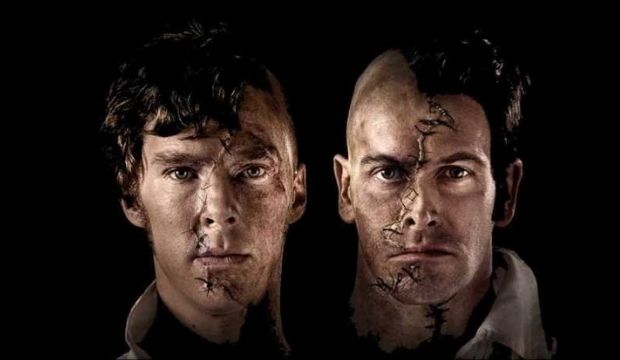
Benedict Cumberbatch and Jonny Lee Miller in Frankenstein
On Thursday 21 May, the major West End producer Sonia Friedman penned a letter in the Telegraph stating: ‘British theatre is on the brink of total collapse… Without an urgent government rescue package, 70 per cent of our performing arts companies will be out of business before the end of this year.’
To cut a long story short, further pleading from the industry and a lot of back-and-forth ensued, before eventually, on Sunday 5 July, culture secretary Oliver Dowden announced a £1.57 billion Culture Recovery Fund, to help the entire culture sector get back on its feet. (However, this initial lump sum failed to take into account freelance theatre-makers, who were left unprovided for.)
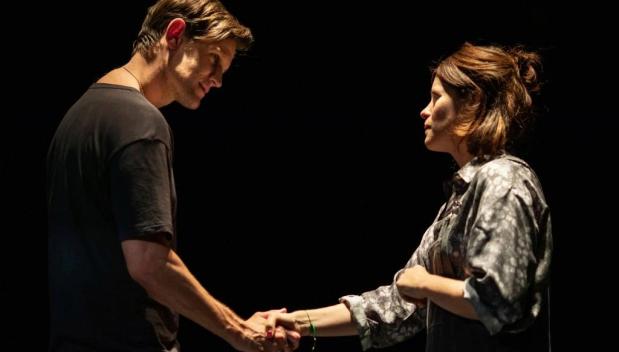
Matt Smith and Claire Foy in Lungs. Photo: Helen Maybanks
All the while, online theatre was becoming more innovative – with companies and venues leaving behind the prototype of pre-recorded productions in favour of recreating the in-person experience as closely as possible by ticket booking systems, prompt start times and a live show.
The Old Vic launched its In Camera series, performing live productions on its stage – including a revival of its 2019 sell-out version of Lungs and an all-new take on Brian Friel’s Faith Healer – to audiences at home. Rightly, it monetised these productions (this was live theatre after all), charging audience members its standard ticket price range of £10 to £65 per streaming device.
Over at the Royal Court, a six-part Living Newspaper was installed, created by a team of writers, actors, designers and technicians, which audience members could pore over at home. More recently, immersive theatre companies have got in on the action, with Les Enfants Terribles, Secret Theatre and Swamp Motel among those to have created bold, interactive productions for audiences to stream online.
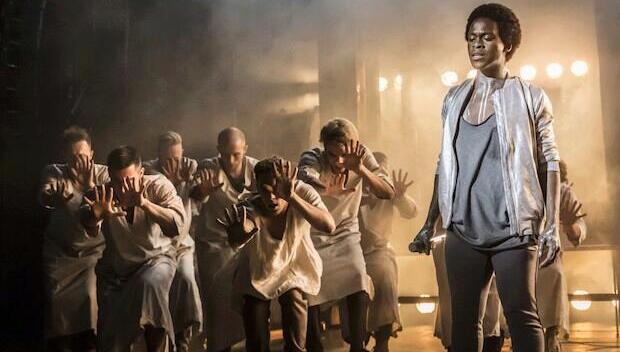
Jesus Christ Superstar at Regent's Park Open Air Theatre
With high summer came the reopening of the UK’s outdoor theatres, given the green light so long as social distancing was observed on and off the stage. Productions including a concert staging of Jesus Christ Superstar at Regent's Park Open Air Theatre ran at a limited capacity, in many cases showing to an audience a fifth of the number the venue would normally hold.
Then, on Saturday 15 August, indoor theatres were allowed to reopen, again at a limited capacity and with strict social-distancing rules in place (masks on throughout the performance, empty seats between bubbles). Many theatres remained closed, unable to turn a profit by reopening to such small numbers. Others took the plunge, some with ingenious new safety apparatus in place. Southwark Playhouse was one such venue, creating Perspex pods for its bubbled-up audience members.
Most live productions were small-scale, including the Bridge theatre’s a versatile series of monologues and the National’s production of Death of England: Delroy, pulled after press night as theatres were once again forced to close.
Despite venues doing what they could to make the experience safe, this fragile reopening period was short lived. On Thursday 5 November came a second national lockdown, followed by the government’s well-intended but somewhat disastrous Operation Sleeping Beauty, which encouraged the industry to prepare for Christmas, only for productions to be cancelled just days after opening, as London was hauled into Tier 3 to combat another spike in infections.
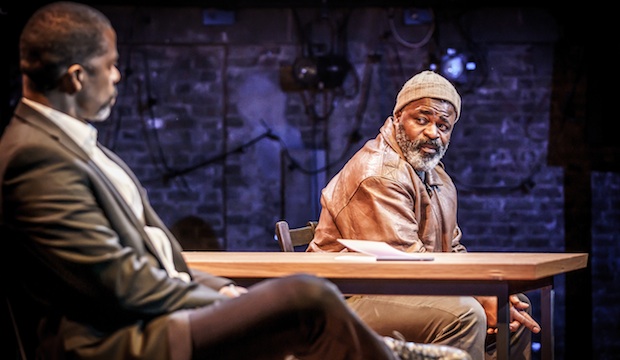
Adrian Lester and Danny Sapani, Hymn at the Almeida. Photo: Marc Brenner
Through the many hurdles, setbacks and disappointments, theatre-makers have persevered. While a return to our plush-seated, history-riddled venues and a chance to congregate hugger-mugger at the bar pre- and post-performance is the reunion we’re all desperately holding out for, the new year has brought with it some of the most brilliantly crafted, expertly honed online theatre yet. Among them, Lolita Chakrabarti’s two-hander Hymn, which captivated us with close-up shots and crafty camera angles as well as two stunning performances.
Born out of necessity, this new wave of online theatre has allowed productions to reach far wider audiences. While not necessarily the future of theatre, Goold sees advantage to running online streams to complement in-person performances. 'It’s definitely something we’re exploring. A big factor is the cost of live-streaming alongside a full in-person run but what makes streaming so appealing is its ability to reach new audiences, particularly those outside of London and internationally,' he says.

Photo: Unsplash
'Of course, the fatalistic view would be to anticipate future times when we might have to return to a lockdown of sorts so the more we can broaden our offer going forward the better shape we will be in,' he adds, pointing out that one positive of the last 12 months has been witnessing the industry become more resilient. Now, it has the survival tools in place should something like this happen again.
The theatre industry has been displaced for a year now. It’s sought refuge online, at makeshift pop-up outdoor venues and through performing on stage to an empty auditorium. The government’s roadmap out of lockdown has suggested Monday17 May as the tentative date theatres can reopen at 50 per cent capacity, and Monday 21 June for a return to full-house performances, provided the infection rate hasn’t risen. The government has also recently topped with the Culture Recovery Fund with another £300 million.

Carrie Hope Fletcher as Cinderella
What theatres will reopen with when these dates finally come around remains uncertain. Existing West End hits including Six the Musical and Everybody’s Talking About Jamie have announced they’ll be reopening in May, with Andrew Lloyd Webber’s Cinderella due to become the first new major West End musical to open two months later on Wednesday 14 July.
As for Off West End venues, which programme plays for shorter runs, at the time of writing, reopening plans have yet to be announced. All are harbouring a backlog of productions which, at the time of the proposed reopening, will date back over a year.
'It’s been so positive receiving those ‘not before’ dates, but if we’ve gone into rehearsals for a show that’s due to open on Monday 21 June and then, a week beforehand, we’re told we can’t open, it has the potential to be very damaging,' says Goold, who’s hoping to reopen the Almeida in May. ‘Nothing is set in stone yet but, yes, we hope to put on work for a socially distanced audience in May and hopefully for a full house from late June,’ he reveals. ‘Obviously, all of it is dependent on the government being able to stick to the roadmap.’

4000 Miles was due to be Timothée Chalamet's London Theatre debut
In many cases, it’s not so simple as venues picking up where they left off. Several of the last year’s most anticipated productions have pre-existing ticket sales linked to certain cast members. Among them, the Old Vic’s production of 4000 Miles, which was due to open in April 2020 starring Hollywood darling Timothée Chalamet.
As the Evening Standard’s Jessie Thompson shrewdly pointed out in an interview with the Old Vic’s artistic director Matthew Warchus: ‘Crucially, 4000 Miles was totally sold out – normally a meaningful contributor to a theatre’s finances, but now a large amount of money in the bank that the theatre cannot touch. Everyone who bought a ticket is owed a show (or a refund, if they’re mad).’ But what if the big starry names attached to particular productions no longer have availability in their jam-packed schedules to fit in a stint on the London stage? Only time will tell.
Today, Tuesday 16 March 2021, we’re looking back on a year of upheaval never before experienced by the theatre industry. But the story isn’t finished. For now, theatre-makers, supporters and audience members alike are waiting with bated breath for the next chapter to begin.
To help support the theatre industry, consider making a donation to the Theatre Artists Fund, an organisation publically backed by its former beneficiaries including Michaela Coel and Denise Gough, which provides emergency support for theatre workers and freelancers across the UK.
On Monday 16 March 2020, the Society of London Theatre (SOLT) and UK Theatre issued a joint statement ordering theatres to close with immediate effect to help slow the rapid spread of Covid-19. The announcement came at 6.40pm, shortly before curtains were due to rise across London’s West End (and beyond), leaving Theatreland awash with confusion. Would-be theatregoers arrived at venues – some having travelled to London from other parts of the country with pre-booked tickets – only to be told the evening’s performance would not be going ahead.
The warning signs were there. Broadway had shut down entirely four days earlier on Thursday 12 March (and, unlike the West End, has not reopened intermittently between lockdowns). Audience numbers had been dwindling too, with many ticket-holders choosing to cut their losses and stay at home for fear of catching the virus. A handful of venues, including the Arcola theatre in Dalston, had already suspended all public performances.
The grave but necessary decision to close all theatres was monumental and (for want of a less overused term) unprecedented. But few could have predicted that our theatres would remain dark, their doors locked, a year on.

Rupert Goold, artistic director at the Almeida Theatre. Photo: Chris McAndrew
'Back in March last year it was unthinkable that we’d still be in this position now,' says the Almeida Theatre’s artistic director Rupert Goold, who describes his current state of mind as 'tired' and 'grieving', but thankful that children have gone back to school.
A lot has happened to the theatre industry over the last 12 months. While the venues themselves have fallen silent, it’s been a laborious year for many industry professionals, who have been forced to make considerable sacrifices and drastically adapt their ways of working, pushing theatre into its most significant period of innovation in decades.
The initial weeks of lockdown saw frantic theatre-makers rally together, with everyone from graduates through to celebrities taking part in a spate of new online initiatives, performing readings of Shakespeare on Zoom, musical hits for YouTube scratch nights and everything in between. Much of what ran was thanks to the bravery of its cast members, many of whom put aside their own financial concerns to participate in unpaid initiatives out of sheer devotion to the performing arts.

James Corden in One Man, Two Guvnors
It wasn’t long before online theatre hit the mainstream. On Thursday 2 April, the National Theatre streamed its first ‘live’ YouTube performance: 2011’s smash-hit production of Richard Bean’s comedy One Man, Two Guvnors, starring James Corden. It was a national success, with over 209,000 theatre-starved households tuning in at 7pm to watch the show play out in real time.
Sensing the appetite, the National Theatre occupied that same weekly slot to stream a 15-week series of pre-recorded productions – Sally Cookson’s Jane Eyre and Danny Boyle’s Frankenstein among them – before eventually launching a streaming platform, NT at Home, from which home audiences could purchase recordings of a broad range of past productions at £6.66 each, or subscribe for an annual membership.
Other venues and companies followed suit, offering up their own pre-recorded productions. But under this patchwork surface, the industry was plummeting into dire financial straits. Among the biggest overheads still needing to be paid was the rent on the venues themselves, many of which occupy prime central London real estate.

Benedict Cumberbatch and Jonny Lee Miller in Frankenstein
On Thursday 21 May, the major West End producer Sonia Friedman penned a letter in the Telegraph stating: ‘British theatre is on the brink of total collapse… Without an urgent government rescue package, 70 per cent of our performing arts companies will be out of business before the end of this year.’
To cut a long story short, further pleading from the industry and a lot of back-and-forth ensued, before eventually, on Sunday 5 July, culture secretary Oliver Dowden announced a £1.57 billion Culture Recovery Fund, to help the entire culture sector get back on its feet. (However, this initial lump sum failed to take into account freelance theatre-makers, who were left unprovided for.)

Matt Smith and Claire Foy in Lungs. Photo: Helen Maybanks
All the while, online theatre was becoming more innovative – with companies and venues leaving behind the prototype of pre-recorded productions in favour of recreating the in-person experience as closely as possible by ticket booking systems, prompt start times and a live show.
The Old Vic launched its In Camera series, performing live productions on its stage – including a revival of its 2019 sell-out version of Lungs and an all-new take on Brian Friel’s Faith Healer – to audiences at home. Rightly, it monetised these productions (this was live theatre after all), charging audience members its standard ticket price range of £10 to £65 per streaming device.
Over at the Royal Court, a six-part Living Newspaper was installed, created by a team of writers, actors, designers and technicians, which audience members could pore over at home. More recently, immersive theatre companies have got in on the action, with Les Enfants Terribles, Secret Theatre and Swamp Motel among those to have created bold, interactive productions for audiences to stream online.

Jesus Christ Superstar at Regent's Park Open Air Theatre
With high summer came the reopening of the UK’s outdoor theatres, given the green light so long as social distancing was observed on and off the stage. Productions including a concert staging of Jesus Christ Superstar at Regent's Park Open Air Theatre ran at a limited capacity, in many cases showing to an audience a fifth of the number the venue would normally hold.
Then, on Saturday 15 August, indoor theatres were allowed to reopen, again at a limited capacity and with strict social-distancing rules in place (masks on throughout the performance, empty seats between bubbles). Many theatres remained closed, unable to turn a profit by reopening to such small numbers. Others took the plunge, some with ingenious new safety apparatus in place. Southwark Playhouse was one such venue, creating Perspex pods for its bubbled-up audience members.
Most live productions were small-scale, including the Bridge theatre’s a versatile series of monologues and the National’s production of Death of England: Delroy, pulled after press night as theatres were once again forced to close.
Despite venues doing what they could to make the experience safe, this fragile reopening period was short lived. On Thursday 5 November came a second national lockdown, followed by the government’s well-intended but somewhat disastrous Operation Sleeping Beauty, which encouraged the industry to prepare for Christmas, only for productions to be cancelled just days after opening, as London was hauled into Tier 3 to combat another spike in infections.

Adrian Lester and Danny Sapani, Hymn at the Almeida. Photo: Marc Brenner
Through the many hurdles, setbacks and disappointments, theatre-makers have persevered. While a return to our plush-seated, history-riddled venues and a chance to congregate hugger-mugger at the bar pre- and post-performance is the reunion we’re all desperately holding out for, the new year has brought with it some of the most brilliantly crafted, expertly honed online theatre yet. Among them, Lolita Chakrabarti’s two-hander Hymn, which captivated us with close-up shots and crafty camera angles as well as two stunning performances.
Born out of necessity, this new wave of online theatre has allowed productions to reach far wider audiences. While not necessarily the future of theatre, Goold sees advantage to running online streams to complement in-person performances. 'It’s definitely something we’re exploring. A big factor is the cost of live-streaming alongside a full in-person run but what makes streaming so appealing is its ability to reach new audiences, particularly those outside of London and internationally,' he says.

Photo: Unsplash
'Of course, the fatalistic view would be to anticipate future times when we might have to return to a lockdown of sorts so the more we can broaden our offer going forward the better shape we will be in,' he adds, pointing out that one positive of the last 12 months has been witnessing the industry become more resilient. Now, it has the survival tools in place should something like this happen again.
The theatre industry has been displaced for a year now. It’s sought refuge online, at makeshift pop-up outdoor venues and through performing on stage to an empty auditorium. The government’s roadmap out of lockdown has suggested Monday17 May as the tentative date theatres can reopen at 50 per cent capacity, and Monday 21 June for a return to full-house performances, provided the infection rate hasn’t risen. The government has also recently topped with the Culture Recovery Fund with another £300 million.

Carrie Hope Fletcher as Cinderella
What theatres will reopen with when these dates finally come around remains uncertain. Existing West End hits including Six the Musical and Everybody’s Talking About Jamie have announced they’ll be reopening in May, with Andrew Lloyd Webber’s Cinderella due to become the first new major West End musical to open two months later on Wednesday 14 July.
As for Off West End venues, which programme plays for shorter runs, at the time of writing, reopening plans have yet to be announced. All are harbouring a backlog of productions which, at the time of the proposed reopening, will date back over a year.
'It’s been so positive receiving those ‘not before’ dates, but if we’ve gone into rehearsals for a show that’s due to open on Monday 21 June and then, a week beforehand, we’re told we can’t open, it has the potential to be very damaging,' says Goold, who’s hoping to reopen the Almeida in May. ‘Nothing is set in stone yet but, yes, we hope to put on work for a socially distanced audience in May and hopefully for a full house from late June,’ he reveals. ‘Obviously, all of it is dependent on the government being able to stick to the roadmap.’

4000 Miles was due to be Timothée Chalamet's London Theatre debut
In many cases, it’s not so simple as venues picking up where they left off. Several of the last year’s most anticipated productions have pre-existing ticket sales linked to certain cast members. Among them, the Old Vic’s production of 4000 Miles, which was due to open in April 2020 starring Hollywood darling Timothée Chalamet.
As the Evening Standard’s Jessie Thompson shrewdly pointed out in an interview with the Old Vic’s artistic director Matthew Warchus: ‘Crucially, 4000 Miles was totally sold out – normally a meaningful contributor to a theatre’s finances, but now a large amount of money in the bank that the theatre cannot touch. Everyone who bought a ticket is owed a show (or a refund, if they’re mad).’ But what if the big starry names attached to particular productions no longer have availability in their jam-packed schedules to fit in a stint on the London stage? Only time will tell.
Today, Tuesday 16 March 2021, we’re looking back on a year of upheaval never before experienced by the theatre industry. But the story isn’t finished. For now, theatre-makers, supporters and audience members alike are waiting with bated breath for the next chapter to begin.
To help support the theatre industry, consider making a donation to the Theatre Artists Fund, an organisation publically backed by its former beneficiaries including Michaela Coel and Denise Gough, which provides emergency support for theatre workers and freelancers across the UK.
TRY CULTURE WHISPER
Receive free tickets & insider tips to unlock the best of London — direct to your inbox